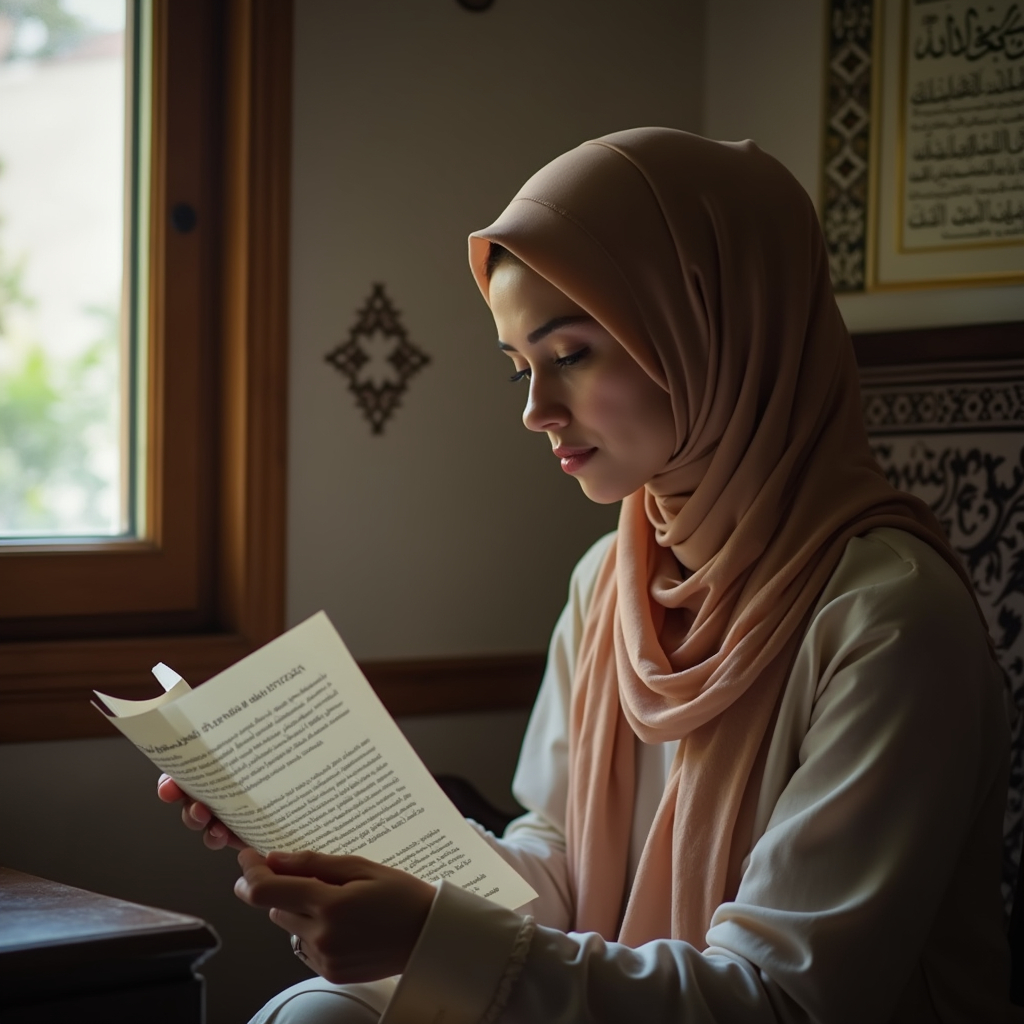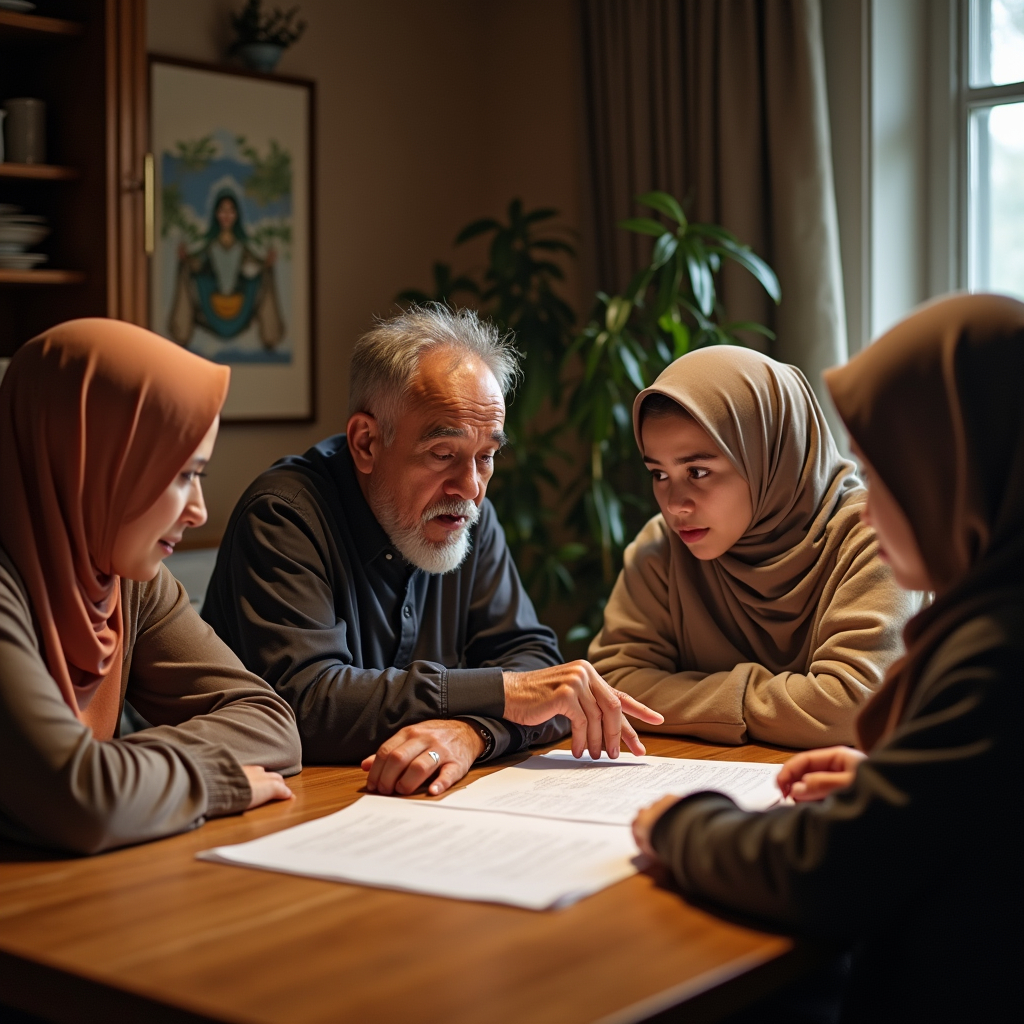This article is authored by Neha Gururani and further written by Titas Biswas. This article is exhaustive of all the aspects of Wasiyat (will) under Muslim law, where the authors have delved deep into the concept of Wasiyat (will), validity of a will, formalities of a will, limitations of a will, who are eligible to take properties, the procedure of revocation of a will, consequences in cases where the share of a will is specified and otherwise, a contrasting distinction of this concept under Sunni law and Shia law and, other such aspects.
Table of Contents
Introduction
Methods of disposition of property are diversified under both Hindu law and Muslim law. Both of them, being derived from the customary laws, have varied rules and laws. Under Islamic law, a Muslim can dispose of his property by gift, by creating a wakf or by using his testamentary powers i.e. by making a will.
The concept of a will under Islamic law is a sort of bargain between two different propensities. One, the view of the prophet is clear that after the death of a person, his property has to be distributed to his heirs, and this rule is considered as divine law, and any interference to it is unacceptable. On the other hand, it is a moral duty of every Muslim to make appropriate arrangements for his property after his death. A will is said to be a moral compass of every Muslim person that guides him to maintain a balance between charity and responsibility towards his family without deviating from the right path.
A great Muslim Commander Sa’d Ibn Abi Waqqas, once recited a story of his divine encounter with the Messenger of God during his Farewell Pilgrimage. He shared his agony with the Prophet about him leaving behind his huge property after his death and that he only had his daughter to inherit. While sharing his concern, Abi Waqqas expressed his intention to bequeath two-third of his property in the form of a gift. The Prophet instructed him to donate one-third of his property and reserve a greater amount for his daughter and emphasised that leaving his daughter with stable financial support is better than leaving her dependent on others.
Meaning and nature of wasiyat (will) under Muslim Law
Conventionally, a will, also called ‘testament’ is a method which enables a person to dispose of his own property by giving it to someone whom he wants to give after his death. A will comes into effect only after the death of the person who created the will. A will is a legal declaration of a property that is transferred after the death of the owner of such property. A will is basically a legal document that declares the intention of the testator (maker of the will) in accordance with the distribution of his property, where such disposition comes into effect after the death of the testator.
Although the definition of ‘wasiyat’ has not been derived from a codified source, in Islamic law, a will executed by a Muslim is known as ‘wasiyat’. According to Tyabji, the meaning of ‘wasiyat’ is ‘precept’, which generally means commandment or directive intended. A very famous Muslim scholar ‘Ameer Ali’ defined a will from the point of view of Mussalman as a divine institution because its exercise is regulated by the Holy Quran. Al-Bukhari (A pre-dominant Hadith Scholar), in his book Sahih Al-Bukhari, mentioned Abdullah bin Umar, who was one of the sons of the second Caliph Umar and a companion of Prophet Muhammad, who narrated one of the Prophet’s teachings that “A Muslim who has something has no right even to pass two nights without making a will unless he has already written one”.
A will must be bequeathed, maintaining certain restrictions and limitations. The application of such limitations is not uniform under both Sunni law and Shia law. Under Shia law, a will made beyond one-third of the total estate of the testator is valid only if the heirs have consented to it.
It can, therefore, be held that a will is a voluntary transfer of ownership done through a testamentary declaration, which comes into effect after the death of the testator. The legal concept of will can be hence presumed as a testamentary gift.
Parties to a wasiyat (will)
Testator
The maker of a will is the testator of that will. A testator must be a Muslim, sane, have attained the age of eighteen, and have consented to the making of such will free from any undue influence or coercion.
Legatee
The person in whose favour a will is made is the legatee of that will. The prerequisites of a legatee include being a human in existence, which also encompasses an unborn person in its mother’s womb. A legatee can either accept or renounce the property in a will.

Legacy
A legacy in a will denotes the property bequeathed in the will. It is often used interchangeably with the property in the will, which is set to be disposed of at the execution of such will.
Executor
An executor is a person appointed by the testator of a will to execute the will in accordance with the contents and directions of the will. The court may assign an executor (also called as an ‘administrator’) in the absence of an appointment by the testator.
Essentials of a valid wasiyat (will) under Muslim Law
A will to be valid has to be complied with certain prerequisites. These conditions shall deem a will to be valid and executable. The following are the essential conditions-
- The testator must fulfil all the conditions to be competent to make a will.
- The capacity and consent of the legatee must be present.
- The legacy bequeathed must be a bequeathable property and be in existence at the time of making the will.
- Free consent of the legator must exist at the time of the making of the will.
- The legator must hold the ownership and testamentary rights of the property bequeathed.
Who can make a wasiyat (will)
A valid will has a few conditions, among which the most significant and inevitable condition is the competence of the legator or testator. Without the testator’s legal capacity and competence, the validity of a will does not stand, rendering it null and void. A person fulfilling all these conditions is competent to make a will.
A Muslim
A wasiyat (will) under Muslim law shall be valid only if such will is made by a Muslim person. The laws related to will under Muslim law declare that only a Muslim person is eligible to make wasiyat. However, the legatee, that is, the one in whose favour the property is bequeathed, may be a non-Muslim person.
If a Muslim person has married under The Special Marriage Act, 1954, the provisions of will shall be governed according to The Indian Succession Act, 1925. The prime difference between a will under Muslim law and the Indian Succession Act is that, under Muslim Law, the testator has limited testamentary powers, meaning he cannot make a will of more than one-third of his property. Whereas, there are no such restrictions under the Indian Succession Act and a testator can bequeath all of his properties.
If a Muslim person converts his religion from Islam after making a will and dies as a non-Muslim, the will shall not be invalidated. The logic behind this principle is that, at the time of making the will, the testator was a Muslim. However, it must be noted that a will has to be governed according to the laws of the specific school of Muslim thought to which the legator belongs.
Sound mind
The principles of Mohammedan law state that the testator, while making a will, must be of sound mind and know the nature and consequences of his acts. The testator must have the knowledge and intention of bequeathing such property. The Patna High Court, in the case of Abdul Manan Khan vs. Mirtuza Khan And Ors. (1991), observed that any Muslim person who is of sound mind and is not a minor may make a will to dispose of his property.
Tyabji, in his book, ‘Principles of Muhammadan Law (1913)’ quoted, “A will made by a person when his mind is unsound does not become valid by his subsequent becoming of sound mind. A will made by a person while of sound mind becomes invalid if the testator subsequently becomes permanently unsound of mind.” Section 578 of this book provides the provisions for the ‘Competence of Testator to make a will’. Another prescription regarding the soundness of mind of a testator under Muslim law can be traced in Ameer Ali’s Book of ‘Mohammedan law’ where he referred to a view expressed by a legal Scholar that if a testator bequests his property and subsequently becomes a lunatic, such bequest may become void. It is further expressed that, in a case where the period of unsoundness remains for six months only, the bequest shall remain valid.
A major

A testator must have attained the age of majority while making a will. Generally, the age of majority under Muslim law is considered to be 15 years. However, this is not applicable in the case of wills in India. The age of majority of a Muslim person, with the exception regarding the matters of marriage, divorce, dower and adoption, is governed by The Indian Majority Act, 1875, which is 18 years. However, in circumstances where the court has appointed a guardian for a minor or the property of the minor has been assumed under the superintendence of a Court of Wards, the age of majority of the minor shall be regulated according to The Court of Wards Act, 1977, which is 21 years.
According to Shia law, the majority of a legator is immaterial with regards to assessing the validity of a will, and a Muslim person who is 10 years old may also make a will. However, this stance was not supported by the Patna High Court in the case of Abdul Manan Khan vs. Mirtuza Khan And Ors. (1991), and established that a will declared by a minor is void.
Legator’s death by suicide
Under Shia law, a will made by a legator after his death by suicide is void. The logic behind this principle is the instability of the mind and the incapability of rational thinking. However, the court, in the case of Mazhar Hussain vs. Bodha Bibi (1898) 21 ALL 91 P.C, held that a will made by a person before the consumption of poison or doing any act towards the commission of suicide shall be valid. It is to be noted that the onus of proving the invalidity of a will under this rule is upon the person alleging it.
There has been no such exception under Sunni law, and hence, the invalidity of will under this rule is not applicable under Sunni law.
Free consent of Legator
A will is a testamentary disposition, which is basically a contractual document. Therefore, for a will to be valid, all the essential elements of a valid contract must be incorporated, and the free consent of the maker of a will is one of them. A free consent is that which is not influenced by undue influence, coercion, fraud or willful misrepresentation. Therefore, while making a will, a legator must have free consent to make it and should not be forced or threatened for the same.
Generally, free consent is presumed by law and in a situation of discrepancies, the burden of proof to prove valid and free consent of the legator lies on the person asserting the validity of the will. This was also solidified by a Delhi District Court in the case of Rahisuddin vs. Fatima (2020).
Who can take property under a will
As discussed earlier, a testamentary disposition is in the form of a contractual agreement and hence, the consent of a legator must be mandatorily free. Similarly, for a will to be valid, the competence of a legatee must also be present. Following are the points that determine a proper legatee. –
Person in existence
A legatee has to be in existence to accept a will in his favour. A will is made by a legator in favour of a legatee, for it to be executed after his death but during the lifetime of such legatee. If a legator survives a legatee, under Shia law, such a legacy will lapse in the absence of legal heirs of the legatee. Meanwhile, under Sunni law, the bequeathed property shall be reverted to the legator.
Although, a will may be declared in the favour of an insane person, a minor or a non-Muslim person. However, the person in whose favour the property is bequeathed must not be hostile towards Islam. It is important that a legatee is competent and in existence to hold the property. The age, sex, caste, religion, gender and state of mind are immaterial for a legatee to be competent. A will in favour of a charitable or educational institution is also valid and such institutions hold the competence to be a valid legatee. However, a religious institution that propagates another religion and degrades Islam shall not be a competent legatee as held by the Lahore High Court under Badrul Islam Ali Khan v Ali Begum, AIR 1935 Lah 251. However, a Muslim person cannot, through his Wasiyat, build a Church or any other religious institution other than Masjid. Such a religious institution will not be a valid legatee. This has been discussed in detail under the heading ‘Wasiyat for pious purposes’ later in this article.
Unborn child

A will to a child who is in the mother’s womb is valid, provided that the child must be in existence in the mother’s womb at the time of declaration of the will. The non-existence of the legatee at the time of declaration of will by the testator invalidates the will and makes it void ab-initio. This stance was held by the court in the case of Abdul Cadur Haji Mahomed vs. C.A. Turner Official Assignee And Ors. (1884). The Bombay High Court, in this case, referred to Baille’s book of ‘A digest of Moohummudan law’, where he solidified the second condition of bequeathing property through a will in the case of an unborn child. He affirmed the validity of a will declared in favour of the unborn child if that child is born within six months from the date of bequeathing under Sunni law and ten months duration under Shia law.
Legator’s murderer
A will is a testamentary disposition and such a document is executed only after the death of the testator. Therefore, a situation may arise where someone attempts to take undue advantage of this arrangement, hence committing murder of the testator. A will in favour of such a person is void. Tyabji, in his Book ‘Principles of Muhammaden law’ wrote about the origin of this principle. He states that the original cause of inheritance in the pre-Islamic period arose from envious relationships that ended in bloodshed. He also quoted the lines uttered by Justice Sir S. Evans while examining a case, “It is clear that the law is that no person can obtain, or enforce any rights resulting to him from his own crime, neither can his representative, claiming under him, obtain or enforce any such rights.”
An unintentional death caused by a legatee of a legator would also invalidate the will. However, under Shia law, such causing of death does not hold the will to be invalid, provided that the legal heirs must have the consent to it. However, if such legatee is the sole owner, no consent would be required, and he shall be a valid legatee.
Consent of Legatee
In the concept of will, the consent of both parties to it has to be mandatorily free. Therefore, the transferring of the ownership of the legacy to the legatee needs to be in alignment with the legatee’s consent. A legatee has a complete right to disclaim the will, and on such a disclaim, the bequeathed property shall not be transferred to the legatee. However, under Shia law, a legatee may accept a part of the bequest and may disclaim the remainder.
In a situation where the legatee survives the testator without assenting or disclaiming the bequest, according to Sunni law, he shall be presumed to have impliedly assented to it. Whereas, according to Shia law, the right to accept or disclaim the bequest rests with the heirs.
Joint Legatee
A will may be declared in favour of more than one legatee, such legatee are known as Joint legatee. There may arise two circumstances under the notion of joint legatee. Firstly, where the share is specified and secondly, where the share is unspecified.
Where the share is specified
In a will where the shares are specified expressly by the legator, the property to be bequeathed must be distributed in accordance with the share specified.
For example, if a testator creates a will in favour of his three sons, specifying that the distribution ratio among them should be 3:2:1 for S1, S2, and S3, respectively, the property will be divided among the three sons according to the ratio set by the testator.
Where the share is not specified
If, in a will, no share is specified by the testator, the property bequeathed must be distributed equally among the legatees. When a will is declared in favour of a class of persons, such class shall be treated as a single legatee only as against another class of people.
For example, if a legator makes a will of one-third of his property for his Son ‘X’ and for the faqirs, ‘X’ and the faqirs will receive one-sixth of his estate each. Here, the faqirs are assumed to be a single legatee as it represent a class of persons.
Another example might be, where a legator makes a will of one-third of his property to his three cousins, the faqirs and to a class of extremely poor people. Here, one-fifteenth of the property shall be distributed among these three classes of people.
Formalities of a wasiyat (will) under Muslim Law

Muslim law does not explicitly specify any formalities for the execution of a will. A will is mostly determined by the intention of the maker of that will. However, in the case of Suleman Kadr vs. Darah Ali Khan (1881), the Calcutta High Court held that the intention of a will must be explicit, clear and unequivocal in nature. Several precedential laws have also observed that a will must not contain strenuous vocabulary or jargon words. A will must be framed in simple sentences and avoid complicated sentences, as was held by the Allahabad High Court in the case of Mazhar Huaen vs. Bodha Bibi (1898) 21 All 91. In the case of Kuvarbai vs. Mir Alam Khan (1883), the court expressed that the intention of the legator must be equivalent to the declaration made by him in the will.
Oral will
A will may be declared orally by simply uttering words like “I, now bequeath this property in the name of ‘X’ after my death”. A mere announcement of making a will validates the will. Although, the burden of proof of the valid existence of such a will may be hefty. Ultimately, an oral will has to be proved with extreme fidelity with precision in date, time and place.
In a situation where, despite having an ample amount of time, a will is made orally, it might throw a light of doubt but shall not vitiate the validity of such will. This stance was held by the court in the case of Tameez Begum vs. Furhut Hoseein (1870) 2 N. W. 55.
Written will
A written will does not require to follow any specifically prescribed form. An unambiguous and clearly intended will shall be enough to validate such will. A will stands valid even if it is not signed by the legator or attested by the witnesses. In the case of Aulia Begum vs. Ala uddin (1906), the Allahabad High Court upheld the validity of the will, where it was not signed by the testatrix or attested by any witnesses. It expressed that a clear intention and prior direction of making such will shall constitute it to be valid. The court, in this case, referred to the case of Parker vs. Filgate (1883) L. R, 8. P. D, 171, in which it was observed that a will shall be valid if it is made in accordance with the instructions provided by the testatrix (a woman testator), even though at the time of execution, the testatrix does not recollect the instructions in detail but believes that the will was made in the furtherance of her direction. The court, while examining the case of Aulia Begum referred to certain other cases of England, which were related to will. It came to its conclusion by holding that under the law of will, in Mohammedan law, no formality is required as such, including the signature of the testatrix or attestation of any witness. It is also mentioned in the divine guidance of the Quran. Fulfilment of all the essential conditions of a will justifies the will to be valid.
Will made by gestures
Under Islamic law, a will may be made by gestures. According to Bailee and Tyabji, if a sick person, while making an endowment, expresses his intention for the same by nodding his head, shall be said to be making a valid will.
Will made on death-bed
A will made by the testator on his death-bed, formally called as ‘Marz-ul-Maut’, is a valid will. The limited testamentary powers of the testator apply here as well, which restricts him to bequest more than one-third of his property. The bequest made under this case must be devoid of any condition and followed by the death of the testator, or else such bequest will be invalid. This was held in the case of Ibrahim Goolam Ariff vs. Saiboo (1907), where the property in question was held to be a valid gift rather than a will because the bequest was not followed by the death of the testator.
Subject-matter of a will
The subject matter of a will can be of any nature, whether corporeal or incorporeal, movable or immovable. However, a testator has the power to bequeath his property by a will only after fulfilling the following conditions.
- If the legator owns the property at the time of his death.
- The property bequeathed must be transferable.
- A bequest also includes the right to possess a house in the future or to enjoy usufructs of immovable property or otherwise for a limited period of time or till the death of the legatee.

A property bequeathed in a will may not mandatorily be in existence at the time of making such will. However, a legator must hold the ownership of the legacy at the time of his death. The logic behind this rule is that a will has to come into operation after the death of the testator and not at the time of declaration of the will.
For example, ‘A’ declares a will bequeathing all his property to ‘B’. Suppose ‘A’ owns a house at the time of execution of the will, but at the time of his death, he owns a car as well. Thus, ‘B’ shall be entitled to have the house as well as the car under the will.
In a situation where the description of an article in the will forms a subject but does not specify an appropriate article, such an article has to be purchased from the estate of the testator and given to the legatee to validate the bequest.
Bequest of wasiyat (will) for pious purposes
A Muslim can bequest his estate for pious purposes, which includes religious, institutional, educational and other charitable purposes. The testamentary limits on the testator for this purpose remain the same. A testator can only bequeath one-third of his estate and no consent of his heirs is required.
Mulla, in his book ‘Principles of Mahomedan Law’ – 20th Ed., mentioned provisions regarding abatement of Legacies under Section 119, where the bequests for pious purposes are categorised as follows according to their purposes –
Bequests for Fairaz
Fairaz, in Islam, means obligation or duty. A Muslim person may bequest property out of his estate for purposes explicitly inscribed in the Quran.
He may bequest for the purpose of visiting ‘Hajj’ (a pilgrimage) or may donate to a pilgrim. He may bequest his property for the purpose of ‘Zakat’, which is considered to be one of the five Pillars of Islam. Zakat is said to be a religious duty where a Muslim person donates 2.5% or 1/40 of his total savings. However, this amount may differ in different Schools of Muslim law. A Muslim person may also bequeath his property for the purpose of compensating for the missed obligatory prayers, that is, to expiate his act of not offering prayer.
Bequests for Wajibat
A Muslim person may bequest for the purpose of Wajibat, meaning ‘essential or necessary parts’. These are the purposes which are not explicitly instructed but are considered to be proper and necessary.
Wajibat includes ‘Sadaqa Al-Fitr’ (Charity to the poor for breaking the fast after Ramadan), ‘Zakat AL-Fitrah’ (Alms of Human Nature), and other sacrifices. A Muslim person may bequest funds from his estate for the purpose of serving food to the poor on the occasion of breaking fast in Ramadan or donate out of his property.
Bequests for Nawafil
Nawafil, under Islam, means ‘voluntary acts’. A Muslim person may bequest his property for charitable purposes such as building a Holy Shrine, a Mosque, an Educational Institution, a place for the travellers to rest and stay, bridges or donating to the poor. He may bequest property out of his estate for such voluntary charitable purposes.
Mulla also prioritised the type of bequests for pious purposes. He stated that a Muslim person should bequest, prioritising the first form of bequest (Fairaz), followed by the second (Wajibat) and the third (Nawafil).
However, apart from the above-mentioned categories, the pious purpose may be subjective under Muslim law. For example, according to Aboo Yoosuf, bequeathing property for digging the grave of a Muslim person is void, provided that the Muslim person is not poor and is physically able. Aboo Yoosuf, who was a believer of the Hanafi School, also believed that it is lawful for a Muslim person to bequeath his property to a poor Christian but it shall be void if he builds a Church for them. According to Prophet Muhammad, charitable purposes included bequeathing for a Hajj or pilgrimage to Mecca, which was opposed by Aboo Yusoof. He opined that charitable purposes should not be restricted to bequeathing for the purposes of Hajj or Pilgrimage and must be expended for the purpose of building bridges, educational institutions or a Masjid.
Limitations on testamentary powers

Every general rule has exceptions and will under Muslim law prescribes limitations on the testamentary powers of a Muslim person. Following is the elaboration of the restrictions:
Limitation as regards to the extent of property to be bequeathed
A Muslim person is permitted to execute a will only to the extent of one-third of his estate after deducting from it all the debts and funeral expenses. If a testator intends to bequeath beyond one-third of his estate to a legatee (whether heir or a non-heir), he has to obtain prior consent from his heirs. This stance was also upheld by the Madras High Court in the case of Asma Beevi vs. M.Ameer Ali (2008). It was held in the case of Jeeva vs. H. H Yakoob Ally (1928) that on account of non-consenting heirs, the bequest shall be valid only up to the extent of one-third of the property of the legator, and the remaining shall be distributed through inheritance.
A Muslim cannot bequeath his property to benefit any of his heirs. The consent of the heirs need not be expressed but can also be drawn by their unambiguous and clear conduct. In the case of Daulatram vs. Abdul Kayam (1902), the testator bequeaths his whole property to a stranger, and such will is attested by the legator’s two sons. After the death of the testator, the legatee started to take possession of the bequeathed property and also received rents. While all this happened in the knowledge of the testator’s sons, it is said that they consented implicitly, as they did not raise any objection.
Tyabji, in his Book of ‘Principles of Muhammadan Law (1913)’ wrote that any bequest by a Muslim person shall be invalid if done for a purpose that opposes Islam. Although, such a bequest shall be valid if it affects the rights and interests of his heirs.
Limitations concerning the legatee
The second restriction arises when the legatee is one of the heirs of the legator. Under this limitation, it is immaterial whether the property bequeathed is one-third or less, and the consent of the other legal heirs becomes a dominant factor in establishing a valid will. In the case of several heirs, consent by one heir shall not be deemed to be consent by the rest of the heirs. This was held by the Kerala High Court in the case of Mohammed Haneefa vs. Salim (2011). The rationale behind this rule is to prevent a testator from preferring one legal heir over others, which could lead to resentment and hostility among the remaining heirs.
On the other hand, Shia (Ithna-Ashari) law doesn’t discriminate between an heir or a non-heir. A will bequeathed in favour of any person or purpose till the extent of one-third of the legator’s estate is treated to be valid. A Muslim person may bequest one-third of his property to one of his heirs without the prior consent of the other heirs. However, a legator must obtain the consent of his heirs if the bequest is made beyond one-third of his property. Under Shia law, the consent given by the heirs is valid if only given in the lifetime of the testator. However, under both Sunni law and Shia law, consent given by the heirs cannot be rescinded.
However, in any case, the consenting persons must be sane, major and Muslim. The testamentary limits of bequeathing property under Wasiyat have to be kept in mind, and any bequest to an heir without the consent of other heirs shall be invalid. This has also been upheld by the Bombay High Court in the case of Ghulam Mohammad vs. Ghulam Hussain (1931).
Construction of a wasiyat (will) under Muslim Law
According to the general rules, a will has to be made in accordance with the customary rules followed under Muslim law and the usage of non-technical and unambiguous language. A will is a testamentary document which comes into operation after the death of the testator of the will. Therefore, a will made by the testator must be interpreted according to his intentions expressed in the instruction of the will. According to Tyabji, on account of an ambiguous and vague will, the interpretation may be left at the discretion of the legal heirs. A will may be oral or written. However, The onus of proving an oral will shall lie upon the person producing such will if contested in the court by other heirs. A written will, however, must specify all the instructions in an unambiguous manner. As stated earlier in this article, a will need not be attested by a witness. However, the circumstances and facts of a case may vary in various cases. A Muslim person is not confined to oblige by any formality to declare a will, provided that such will must reflect clearness, and the intention of the testator.

For example, a legator in his will bequeath a house and a shop to two of his sons without specifying the individual ownership of the properties. Here, the content of the will is mystified, leaving the legatees in dilemma. Thus leaving the heirs to mutually agree upon the division of the property bequeathed in the will.
Revocation of a wasiyat (will) under Muslim Law
A Muslim person has the entitlement to revoke a will made by him. He may revoke a will either by expressing it in words or, impliedly, through his actions. Following is an elaboration of both the forms –
Express revocation
A testator may revoke a will made by him, either in written or oral form. For example, if a person bequeaths his property to someone without any clear indication and instructions and then bequeaths the same property to someone else, the will declared to the former legatee shall stand void.
If a will is burned or torn by the maker of it, the intention of such action must be interpreted as a revocation of such will. However, mere denial of a will shall not revoke the will; it must be followed by an action that would constitute a revocation.
A will executed by the testator by declaring it both in words and through a deed shall be revoked at the declaration of revocation of such will. However, it has been observed that an addition or alteration to the subject matter bequeathed might revoke the bequest if such alteration absolutely changes the nature of the property. It is to be noted that such alteration, if comes with an expressed declaration that it would not vitiate the bequest, would not amount to revocation of the will.
Implied Revocation

An act which leads to the annihilation of the subject-matter of the bequest is considered as an implied revocation of the will. Actions taken by the legator, like transferring property to someone else other than the existing legatee would amount to an implied revocation, as well as destroying or altering the property. However, when the same piece of property has been successively bequeathed to two persons, the former bequest is not necessarily revoked unless expressed by the will. In such a situation, if the legatee to whom the bequest was made later dies, the bequest made to him will stand void, and the bequest made in favour of the former legatee shall be deemed not revoked. Mere denial of a declaration by the testator would not revoke such will.
For example, if ‘A’ bequeathed agricultural land to ‘B’. ‘A’ later built a vineyard on that land. The bequest of such land stands revoked, as the nature of the bequeathed property was altered in a way that it had no existence.
A bequest of property that was sold by the testator, if re-purchased and treated as a gift to the legatee, shall be considered a revocation. The reason behind this rule is the waiver of ownership of the testator from the property. The Calcutta High Court, in the case of Abdul Karim vs. Shofiannissa (1906), held that a bequeathed property shall stand revoked if it is disposed of by the testator by way of alienation.
Exception to the rule of wasiyat
There are certain exceptions to the general rules of wasiyat. Those are the limited testamentary powers of a testator and the mandatory consent of legal heirs. Both under Sunni law and Shia law, the testamentary powers of a Muslim person are restricted to one-third of his property after deducting the debt amount and funeral expenses. Following are some of the exceptions to the general rules of Wasiyat. –
Consent under Shia law
The general rule of consent of other heirs while bequeathing property in the favour of an heir is inapplicable under Shia law. A Muslim person, under Shia law, may bequest not more than one-third of his property to an heir without the consent of the rest of the heirs. This is mostly prevalent in a minor sub-community of this sect of law, called the Shia Ithna-Ashari sect. However, if the property bequeathed exceeds one-third of the estate, consent of other legal heirs is mandatory. Such consent may be given either before or after the death of the testator, as held by the Allahabad High Court in the case of Huseni Begam vs. Syed Mohammad Mehdi (1927). A Shia-Muslim person may bequeath his whole property to an heir, with prior consent from the other heirs. Allahabad High Court upheld this decision in Jafri Khanum vs. Fahmida Khanum (1908) and also reiterated further in the case of Mustafa Husain vs. Amrit Bibi (1923) that, in a case where the bequeathed property exceeds one third of the estate consent of the heirs must be obtained before the death of the testator, else such bequest is void. Such consent may be given with utmost care and, once repudiated, cannot be given again. This stance was held by the Bombay High Court in the case of Mahabir Prasad vs. Syed Mustafa Husain (1937). Similarly, this exception to the general rule cannot benefit an heir, violating the rule against perpetuity.
This exception is also applicable under Hanafi law.
The authoritative text of ‘Shayara-ul-Islam’ despises excluding some children from the bequest. It is suggested that a will bequeathing the whole of the property in favour of one heir by excluding others must be ineffective.

Bequest subject to Conditions
A bequest of property subject to conditions is effective except for the part where the condition has to be applied, provided that such conditions are repugnant to Mohhamedan law. It was held in the case of Abdul Karim vs. Abdul Qayum (1906) 28 All. 324, that where the bequeathed property in favour of an heir was attached with condition to prohibit alienation of the property and other heirs consented to it, the bequest will be valid in the favour of the legatee as if it was made in the favour of a non-heir.
A similar decision was held in another case of Nazir Ali Shah vs. Sughra Bibi (1920) 1 AIR (Lah) 302, that if a bequest is made to an heir with a condition that upon their death, the property shall be transferred to another person, and other heirs consent to the bequest, the legatee will receive the property and the condition shall be deemed to be void.
Hence, under circumstances where a bequest of the entire property is made with incompatible and repugnant condition, such bequest is valid but the condition is void.
An heirless testator
The general rule of bequeathable one-third shall not apply to a case where the testator is heirless. An heirless testator may bequeath his property for charitable purposes or to a stranger. No authority, including the government, may restrict the testamentary right of such a person. Therefore, it can be said that the government is not an heir to an heirless person.
Single heir
A testator may bequest his entire property to his single heir in the absence of any other heir. However, if a testator bequests exceeding one-third of his property to a stranger, consent of the only heir is mandatory.
Custom
A custom prevailing in a community shall be valid if its conditions and limitations vary from the formal rules of Wasiyat under Muslim law, provided it is not against public policy or in conflict with Mohammedan law. In the famous case of Illyas vs. Badshah (1990), the Madhya Pradesh High Court observed that a Muslim person is allowed to bequeath his property to any person, irrespective of religion or race. It was further held that, a custom within the Eunuch Community known as the Guru-chela system, where the chela is considered to be the only heir of his guru, bequeathing of Guru’s property to an outsider with prior consent of his chela is a valid bequest. Under this custom, a Guru cannot bequeath his property to an outsider without the consent of his chela. The court held that this custom is not in violation of the law since it merely limits the choice of the legatee and does not restrict the right to make a will.
Abatement of legacies
If, after settling all the debts to the creditors, indispensable expenses, a legator bequeaths more than one-third of his property, the ratio of the legatees is reduced in order to maintain the rule of bequeathable one-third. This reduction in the legacies of the beneficiaries is referred to as abatement of legacies. According to Sunni law, abatement of legacies occurs in a proportionate method, while under Shia law, such abatement is done preferentially.
Rateable distribution
This rule of abatement is followed under Sunni law. Rateable abatement is also considered as ‘Proportionate reduction’. This reduction is followed when a bequest of more than one-third of the property is made, and the heirs do not consent to it. The shares are calculated and reduced proportionately to one-third of the property afterwards. Such calculation is done upon the total estate, deducting funeral expenses and debts, if any. Apart from Sunni law, rateable abatement is also practised under Hanafi law.
For instance, a will is made by ‘T’ in favour of ‘A’, ‘B’ and ‘C’. Under the will, ‘T’ declares to give Rs. 4,500/- to ‘A’, Rs. 3,000/- to ‘B’, and Rs. 1,500/- to ‘C’, where his total property amounts to Rs. 9,000/-. Now, according to the testamentary restrictions, only one-third of the total property is bequeathable, which equals Rs. 3000/-, which amounts to the permitted bequeathable property. The legator divided the property among A, B and C following the ratio of 3:2:1, respectively. Hence, by applying the rateable abatement rule, the shares of A, B and C shall be reduced following the same ratio i.e. 3:2:1. Thus, after the application of rateable distribution, the share of A will become Rs. 1,500/-, the share of B becomes Rs. 1,000/- and the share of C turns to be Rs. 500/-.
Preferential distribution

Under Shia law, a different rule for abatement applies. According to this rule, if the bequeathable property exceeds one-third of the estate of the legator and heirs refuse to give their consent, the rule of preferential distribution is applied. Under this method of abatement, there is no reduction of shares as such, but the shares are distributed on preference.
The preference under this rule is generally evaluated by the order in which the names of the legatees are mentioned under the will. The legatee, mentioned in the foremost of the testamentary document, shall have the highest preference, followed by the legatee positioned in the second. It may be so that there will be no changes in the shares of the first-mentioned legatee. As soon as one-third of the property is finished, the distribution of shares ceases. Therefore, it may be concluded that a legatee may get his whole share, or a part of it or nothing at all.
For example, a will was executed by ‘T’, who is a Shia Muslim. He bequeathed Rs. 2,000/- to ‘A’, Rs. 1,000/- to ‘B’ and Rs. 1,000/- to ‘C’. The total property is Rs. 9,000/- of whose one-third is Rs. 3,000/-, which is the permitted bequeathable amount. According to the preferential rule, ‘A’ will be bequeathed his full share i.e. Rs. 2,000/-, ‘B’ will be getting the remaining Rs. 1,000/-, which also constitutes his full share, and C will be devoid of any share, as the one-third of the bequeathed amount was exhausted while distributing between ‘A’ and ‘B’ in accordance with preferential distribution.
Executor of a will (Al-Wasi Al-Mukhtar)
A testator may appoint an executor, who shall act as the manager of the testator’s estate and execute such will in accordance with the wishes and instructions given by the testator. According to Section 211(1) of the Indian Succession Act, 1925, an executor is the legal representative of the testator for all the purposes and properties of the deceased legator are vested upon him.
A testator may be a non-Muslim under Hanafi law. This was further upheld by the Madras High Court in the case of Henry Imlach vs. Zuhooroonisa (1828) 4 S.D.A [Beng] 301, 303, that an executor of a will can be more than one person. According to Section 311 of the Indian Succession Act, 1925, where there are several executors, and the direction as to their individual duties is absent, they may act upon the will if they obtain the probate of the will. It is the legal duty of an executor to implement the directions given by the testator in a will.
The powers, duties and other functions of an executor of a Mohammedan will are governed by Chapter VI of the India Succession Act, 1925, which includes the duty to meet all the funeral expenses, settle assets, maintain accounts, apply for probate, etc. An executor has the power to sue for all the causes that survive the deceased and to recover debts on behalf of the deceased. He has the power to dispose of the testator’s property as directed by him.
Marz-ul-Maut
Marz-ul-Maut is a doctrine based on wills made on death-bed. This doctrine refers to gifts made by the testator on his death-bed, and is recognised under both Shia and Sunni laws. The transaction under this principle has the essence of both hiba (gift) and wasiyat (will). However, its nature is considered to be that of a will, as the transfer of the gifted property is executed after the death of the maker of the transfer. This is a testamentary disposition made at the apprehension of the death of the testator and, therefore, is only valid if the testator subsequently dies after making such a will.
The testamentary limitations and restrictions regarding the legatees shall be the same even under this doctrine. However, two specific restrictions have been listed, and they are as follows-
- As a legatee, a successor or heir cannot be precluded. Although, under Hanafi law, a will under Marz-ul-Maut in favour of an heir is valid only if the consent of other heirs is obtained.
- The bequeathing amount must not exceed one-third of the total share of the legator’s estate. This stance was also upheld by the Allahabad High Court in the case of Fazal Husain Khan vs. Ali Husain And Ors. (1914).
On the apprehension of death, a testator on his death-bed cannot circumvent, including his heirs and successors. He may not rationalise such acts and follow up with mandated restrictions implied in the doctrine of wasiyat. The Shariat law also implements certain conditions on Mars-ul-Maut, which are detailed below-
Death of the testator
The maker of the will, under this doctrine, must be suffering from an affliction or disease which is very likely to result in the death of that person. In the consequence of such ailment, the testator survives, the will shall stand invalid and void.
Apprehension of death

As suggested by the title, the will must be made on the apprehension of death of the testator. The apprehension must be comprehended by the testator himself and not by his heirs or his physician. The presence of such apprehension in the mind of the testator is an essential element for it to suffice as a valid will on death-bed.
However, in a case where the disease persists for more than a year without any embellishment, such illness shall not suffice for an apprehension of death. In another situation, where the ailment is enduring in various intervals, which ultimately compels the testator to be confined to bed, may create a grave fear and an apprehension of death. In such cases, a gift may be considered to be made under Marz-ul-Maut.
In Shaik Nurbi vs. Pathan Mastanbi And Ors. (2004), the Andhra Pradesh High Court outlined three parameters that must be complied with for a transfer to be considered under Marz-ul-Maut, briefed as follows.-
- There must be a forthcoming threat of death, inducing a strong sense of apprehension of death.
- There must be a subjective indication of death in the mind of the maker of the document.
- There must be certain external indications that reflect the bad and sufferable health of such a person.
Hence, the person must be suffering from an ailment, which is likely to culminate into death, whose apprehension was in existence in the mind of that person, and such apprehension must also accompany external indications. The external indication may be his absence in important events due to ill-health, long absence from work or medically diagnosed reports. However, it is always ideal to examine the circumstances of a particular case to conclude if the gift falls under Marz-ul-Maut. This situation was observed in the case of Sarabai vs. Rabiabai (1905), where the Bombay High Court observed that attending regular vocations or fulfilling the duties of his everyday life does not constitute an absolute absence of apprehension of death. It may be so that the illness is asymptomatic or silent but at the same time, grave in nature.
Comparison of Sunni and Shia laws pertaining to will
In India, two major schools under Muslim law are prevalent, which are Shia and Sunni law. There are rules that are governed differently in both the schools, which must be followed dutifully and considered by the courts in case of discrepancies.
| Grounds for Comparison | Sunni law | Shia law |
| A bequest to an heir | A legator bequeathing one-third of his property in his will, to one of his heirs without the consent of other heirs, is invalid. | A bequest under Shia law is valid, upto one-third of the property of the legator without taking the consent of the other heirs, but not beyond one-third of the property. |
| Time of Consent of the heirs | Consent of heirs is valid if given after the death of the legator. | Consent may either be given before or after the death of the legator. |
| Legatee being the Murderer of Legator | If a legatee causes the death of the legator, a bequest in his favour shall be void. | An unintentional causing of death by a legatee of the legator shall not affect the validity of the will and the bequest shall be proper. |
| Commission of Suicide by Legator | A will shall be deemed to be valid if a legator commits suicide either before or after the declaration of the will. | A will shall be deemed to be valid only if the legator commits suicide or does any act which contemplates to suicide, after the declaration of the will. |
| Unborn Child | A bequest for an unborn child is valid if the child is in the womb of its mother while the declaration of the will takes place in its favour. However, the child must be born within 6 months of making the will. | Under this, the existence of the child in its mother’s womb is mandatory but, the prescribed limit of taking birth from the time of declaration is 10 months. |
| Abatement of Legacies | In case of a bequest of more than one-third of the legator’s property without the consent of the heirs, the rule of rateable distribution is followed to proportionate the share and reduce it to the extent of one-third. | Under this, the rule of preferential distribution is applied to reduce the bequest amount to one-third. |
| Death of Legatee before Legator | If a legator survives the legatee of a will, the legacy shall revert to the legator. | If a legator survives the legatee of a will, the legacy shall lapse only on account of the legatee being heirless or the legator revokes the will himself. |

Conclusion
A will is a testamentary instrument that empowers a person to create a declaration with directions as to bequeathing his property after his death. It can be said as an improved revision of the succession law, which generally excludes heirs who may be preferred to inherit otherwise. Wasiyat allows a person to devolve his property upon a person whom he may choose. But simultaneously, it also maintains a rational balance between the law of succession and devolution of property under a will. A will is not restricted to being a device to protect one’s heir’s interest but also an instrument to promote charitable and pious works. The concept of will is concerned with the sense of gratuity and charity and originated from a divine incident recited by Sa’d Ibn Abi Waqqas, where he was instructed by the Prophet to donate one-third of his estate and save the remainder for his heirs.
A will, therefore, must be constructed with precision and keeping the intentions and directions of the maker, aligned, being a divine disposition. The objective of will is bifold; firstly, it protects the claims of the lawful heirs. Secondly, a testator may settle one-third of his property in a justified manner in favour of a stranger or non-heir. The governance of a wasiyat may differ from one school under Muslim law to another. Under any discrepancies, the courts must examine all such rules and inspect the sanctity of the will properly.
Frequently Asked Questions (FAQs)
Is will (wasiyat) under Muslim law governed by the Indian Succession Act, 1925?
If a Muslim person is married under The Special Marriage Act, 1954 either to a Muslim or non-Muslim, his will shall be governed by the Indian Succession Act, 1925. A Muslim person married according to Muslim customs and regulations shall be governed by Muslim personal law in the matter of wills. However, the duties, powers and functions of an executor of a will are governed by the Indian Succession Act, 1925 as, an executor is appointed irrespective of his religion and can be a non-Muslim.
Is it mandatory for a will to be registered?
It is not mandatory to register a will. However, it would be easier for the courts to examine the authenticity of such a will, in case of any discrepancies. Registration of a will (wasiyat) may be regulated under Section 40 and Section 41 of The Registration Act, 1908. A non-registered will, hence, is not invalid and very much executable.
Is the subject matter of transfer considered as a gift under Marz-ul-Maut?
It was held by the Supreme Court in the case of Commissioner Of Gift Tax vs. Abdul Karim Mohd. (1991) that a transfer under Marz-ul-Maut does not fall under the scope of gift, and there is no levying of gift-tax under such a transaction. It is a testamentary disposition of property and must be considered as a will.
What is Codicil?
A codicil is an additional document as regards to a will, which is drafted to alter, modify or, add to the provisions of the will. It can be said as an appendix or an extension to a will. A codicil may be altered to the extent of already existing provisions and not beyond what is necessary to fulfil the testator’s intentions.
References
- Muslim law in Modern India by Dr. Paras Diwan.
- Mohammedan law by Aqil Ahmad.
- https://lc2.du.ac.in/DATA/Will.pdf.
Students of Lawsikho courses regularly produce writing assignments and work on practical exercises as a part of their coursework and develop themselves in real-life practical skills.
LawSikho has created a telegram group for exchanging legal knowledge, referrals, and various opportunities. You can click on this link and join:
Follow us on Instagram and subscribe to our YouTube channel for more amazing legal content.
 Serato DJ Crack 2025Serato DJ PRO Crack
Serato DJ Crack 2025Serato DJ PRO Crack










 Allow notifications
Allow notifications


